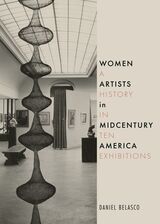223 scholarly books by University of London Press and 21
have author last names that start with B
223 scholarly books by University of London Press and 21
223 scholarly books by University of London Press
21 have author last names that start with B have author last names that start with B
21 have author last names that start with B have author last names that start with B

Octavia Hill, social activism and the remaking of British society
Elizabeth Baigent
University of London Press, 2016
This volume reassesses the life and work of Octavia Hill, housing reformer, open space campaigner, co-founder of the National Trust, founder of the Army Cadet Force, and the first woman to be invited to sit on a royal commission. In her lifetime she was widely regarded as an authority on a broad range of social problems. Yet despite her early pre-eminence, and the remarkable success of the institutions which she helped to found, Hill fell from public favour in the twentieth century. This book provides a nuanced portrait of Hill and her work in a broader context of social change, reflecting recent scholarship on nineteenth-century society in general, and on philanthropy and preservation, and women’s role in them, in particular.
[more]

Administering the Empire, 1801-1968
A Guide to the Records of the Colonial Office in the National Archives of the UK
Mandy Banton
University of London Press, 2015
This guide is an updated version of Mandy Banton's indispensable introduction to the records of British government departments responsible for the administration of colonial affairs, and now held in The National Archives of the United Kingdom. It covers the period from about 1801 to 1966. It has been planned as a user-friendly guide concentrating on the organisation of the records, the information they are likely to provide and how to use the contemporary finding aids. It also provides an outline of the expansion of the British empire during the period and discusses the organisation of colonial governments.
[more]

People, Texts and Artefacts
Cultural Transmission in the Medieval Norman Worlds
David Bates
University of London Press, 2018
This volume is based on two international conferences held in 2013 and 2014 at Ariano Irpino, and at Emmanuel College, Cambridge. It contains essays by leading scholars in the field. Like the conferences, the volume seeks to enhance interdisciplinary and international dialogue between those who work on the Normans and their conquests in northern and southern Europe in an original way. It has as its central theme issues related to cultural transfer, treated as being of a pan-European kind across the societies that the Normans conquered and as occurring within the distinct societies of the northern and southern conquests. These issues are also shown to be an aspect of the interaction between the Normans and the peoples they subjugated, among whom many then settled.
[more]
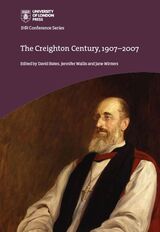
The Creighton Century, 1907–2007
David Bates
University of London Press, 2020
An edited collection of classic lectures from acclaimed historians.
The Creighton Century, 1907–2007 offers a selection of ten classic lectures on history from the first hundred years of the University of London’s prestigious Creighton Lecture series.
This volume offers a chance to revisit some of the great lectures of our time, including previously unpublished lectures by R. H. Tawney, Lucy Sutherland, Donald Coleman, Eric Hobsbawm, and Keith Thomas, published here with commentaries by Virginia Berridge, Justin Champion, Julian Hoppit, and Jinty Nelson, among others. This volume provides a fascinating insight into the development of the discipline of history over the twentieth and early twenty-first century, with lectures on the meaning of truth and modern mythologies, revealing some significant changes in approach and emphasis as well as some surprising continuities.
The Creighton Century, 1907–2007 offers a selection of ten classic lectures on history from the first hundred years of the University of London’s prestigious Creighton Lecture series.
This volume offers a chance to revisit some of the great lectures of our time, including previously unpublished lectures by R. H. Tawney, Lucy Sutherland, Donald Coleman, Eric Hobsbawm, and Keith Thomas, published here with commentaries by Virginia Berridge, Justin Champion, Julian Hoppit, and Jinty Nelson, among others. This volume provides a fascinating insight into the development of the discipline of history over the twentieth and early twenty-first century, with lectures on the meaning of truth and modern mythologies, revealing some significant changes in approach and emphasis as well as some surprising continuities.
[more]

The Creighton Century, 1907-2007
David Bates
University of London Press, 2009

Brave new world
Imperial and democratic nation-building in Britain between the wars
Laura Beers
University of London Press, 2012
After the First World War, Britain faced a number of challenges as it sought to adapt to domestic conditions of mass democracy while maintaining its position in the empire in the face of national independence movements. As politicians at home and abroad sought to legitimize their position, new efforts were made to conceptualize nationality and citizenship, with attempts to engage the public using mass media and greater emphasis on governing in the public interest. Brave New World reappraises the domestic and imperial history of Britain in the inter-war period, investigating how 'nation building' was given renewed impetus by the upheavals of the First World War. The essays in this collection address how new technologies and approaches to governance were used to forge new national identities both at home and in the empire, covering a wide range of issues from the representation of empire on film to the convergence of politics and 'star culture'. The book is an invaluable resource for scholars of British social, political and imperial history, as well as being of interest to the general reader.
[more]

What Future for Human Rights in a Non-Western World?
Simon Bennett
University of London Press, 2012
The countries of the global north and west that have enjoyed hegemonic preponderance in international affairs over the last two centuries are seeing their relative influence on the world stage decline in favour of rising powers of other regions. As the ability of the global north and west to project normative standards with regards to social organisation, international relations and the role of the state is waning, what emerging norms might guide future trajectories for global society? As human rights is a highly politicised and contentious area of discourse and practice, what future might there be for human rights in a non-western world? The London Debates 2011 workshop sought to bring together established academics and early career researchers from a variety of disciplines to reflect upon possible futures for world order and the implications for human rights. In this edited volume, nuanced analysis covers the ongoing debate on the universality of human rights, the outlook for human rights in an Islamic context, the role of civil society in the future of human rights, and human rights in China.
[more]

Organized Labour and Politics in Mexico
Changes, Continuities and Contradictions
Graciela Bensusan
University of London Press, 2012
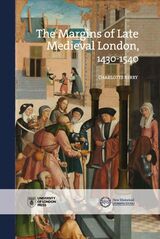
The Margins of Late Medieval London, 1430–1540
Charlotte Berry
University of London Press, 2022
A powerful study of medieval London’s urban fringe.
The Margins of Late Medieval London seeks to unpack the complexity of urban life in the medieval age, offering a detailed and novel approach to understanding London beyond its grand institutions and social bodies. Using a combination of experimental digital, quantitative, and qualitative methodologies, the volume casts new light on urban life at the level of the neighborhood and considers the differences in economy, society, and sociability which existed in different areas of a vibrant premodern city. This book focuses on the dynamism and mobility that shaped city life, integrating the experiences of London’s poor and migrant communities and how they found their place within urban life. It describes how people found themselves marginalized in the city, and the strategies they would employ to mitigate that precarious position.
The Margins of Late Medieval London seeks to unpack the complexity of urban life in the medieval age, offering a detailed and novel approach to understanding London beyond its grand institutions and social bodies. Using a combination of experimental digital, quantitative, and qualitative methodologies, the volume casts new light on urban life at the level of the neighborhood and considers the differences in economy, society, and sociability which existed in different areas of a vibrant premodern city. This book focuses on the dynamism and mobility that shaped city life, integrating the experiences of London’s poor and migrant communities and how they found their place within urban life. It describes how people found themselves marginalized in the city, and the strategies they would employ to mitigate that precarious position.
[more]
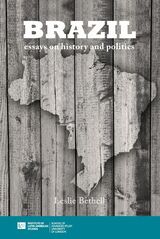
Brazil
Essays on History and Politics
Leslie Bethell
University of London Press, 2018
Published to mark his 80th birthday, this volume consists of seven essays by Leslie Bethell on major themes in modern Brazilian history and politics: Brazil and Latin America; Britain and Brazil (1808-1914); The Paraguayan War (1864-70); The decline and fall of slavery (1850-1888); The long road to democracy; Populism; The failure of the Left. The essays are new, but they draw on book chapters and journal articles published (mainly in Portuguese) and public lectures delivered in the ten years since his retirement as founding Director of the University of Oxford Centre for Brazilian Studies in 2007. In an autobiographical Introduction (Why Brazil?) Professor Bethell describes how, from the most unlikely of backgrounds, he became a historian of Brazil and how he came to devote much of his long academic career to the promotion and development of Brazilian studies in UK (and, to a lesser extent, US) universities. Leslie Bethell is one of the few great Brazilianists, as foreign scholars of Brazil are called, of his and subsequent generations. Brazilianists engage in scholarship that has breadth and depth; illuminate Brazil as an object of study, asking the most important questions that can be asked about the country; and give voice to Brazilian experiences and perspectives. Leslie Bethell has done these things during his long career, and he continues to do so, as this collection of his recent essays on Brazilian history and politics demonstrates. Anthony Pereira, Director, Brazil Institute, King’s College London
[more]

Joaquim Nabuco, British Abolitionists, and the End of Slavery in Brazil
Correspondence 1880-1905
Leslie Bethell
University of London Press, 2009

Latin American and Caribbean Library Resources in the British Isles
A Directory
Alan Biggins
University of London Press, 2001

Studies on Wealth in the Ancient World (BICS Supplement 133)
Errietta M. A. Bissa
University of London Press, 2016
In this volume, seven authors offer distinctive insights into overarching issues in the study of wealth across the Greco-Roman worlds: the sources and maintenance of wealth; the implications for differently organised societies of the division between wealthy and impoverished individuals and groups; and the moral implications of that divide. Some papers address general methodological issues and engage with scholarly debates in sociology and economic theory; others focus on specific historical problems and clusters of evidence. Taken together, the papers open up new perspectives on wealth in the ancient world, its complex relationship with power, and the tensions and contradictions it entails.
[more]

Gender in medieval places, spaces and thresholds
Victoria Blud
University of London Press, 2019
This collection addresses the concept of gender in the middle ages through the study of place and space, exploring how gender and space may be mutually constructive and how individuals and communities make and are made by the places and spaces they inhabit. From womb to tomb, how are we defined and confined by gender and by space? Interrogating the thresholds between sacred and secular, public and private, enclosure and exposure, domestic and political, movement and stasis, the essays in this interdisciplinary collection draw on current research and contemporary theory to suggest new destinations for future study.
[more]
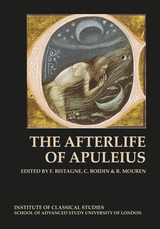
The Afterlife of Apuleius
C. Boidin
University of London Press, 2020
Apuleius’ literary and philosophical fortune has been considerable since antiquity, mostly through the reception of The Golden Ass. The aim of this collection of essays is to highlight a few major aspects of this afterlife, from the High Middle Ages to early Romanticism, in the fields of literature, linguistics and philology, within a wide geographical scope.
The volume gathers the proceedings of an international conference held in March 2016 at the Warburg Institute in London, in association with the Institute of Classical Studies. It includes both diachronic overviews and specific case-studies. A first series of papers focuses on The Golden Ass and its historical and geographical diffusion, from High Medieval Europe to early modern Mexico. The oriental connections of the book are also taken into account. The second part of the book examines the textual and visual destiny of Psyche’s story from the Apuleian fabula to allegorical retellings, in poetical or philosophical books and on stage. As the third series of essays indicates, the fortunes of the book led many ancient and early modern writers and translators to use it as a canonical model for reflections about the status of fiction. It also became, mostly around the beginning of the fifteenth century, a major linguistic and stylistic reference for lexicographers and neo-Latin writers. The last papers of the book deal with Renaissance polemics about "‘Apuleianism" and the role of editors and commentators.
This is the sixth and last of the volumes in the series of ‘Afterlives’ of the Classics, which is being produced jointly by the Institute of Classical Studies and the Warburg Institute.
The volume gathers the proceedings of an international conference held in March 2016 at the Warburg Institute in London, in association with the Institute of Classical Studies. It includes both diachronic overviews and specific case-studies. A first series of papers focuses on The Golden Ass and its historical and geographical diffusion, from High Medieval Europe to early modern Mexico. The oriental connections of the book are also taken into account. The second part of the book examines the textual and visual destiny of Psyche’s story from the Apuleian fabula to allegorical retellings, in poetical or philosophical books and on stage. As the third series of essays indicates, the fortunes of the book led many ancient and early modern writers and translators to use it as a canonical model for reflections about the status of fiction. It also became, mostly around the beginning of the fifteenth century, a major linguistic and stylistic reference for lexicographers and neo-Latin writers. The last papers of the book deal with Renaissance polemics about "‘Apuleianism" and the role of editors and commentators.
This is the sixth and last of the volumes in the series of ‘Afterlives’ of the Classics, which is being produced jointly by the Institute of Classical Studies and the Warburg Institute.
[more]

The Victoria History of Middlesex
St Clement Danes, 1660-1900
Francis Boorman
University of London Press, 2018
. This period was one of rapid urban transformation in the parish, as the large aristocratic riverside houses of the 17th century gave way to a bustling centre of commerce and culture in the 18th. The slums that developed in the 19th century were then swept away by the grand constructions of the Royal Courts of Justice and the Victoria Embankment, followed by the new thoroughfares of Aldwych and Kingsway, which are still the major landmarks in the area. Characterised by its contrasts, St Clement Danes was home to a mix of rich and poor residents, including lawyers, artisans, servants and prostitutes. The history of this fascinating area introduces a cast of characters ranging from the Twinings tea-trading family, to the rowdy theatre-going butchers of Clare Market and from the famous Samuel Johnson, to the infamous pornographers of Holywell Street. This book also unpicks the complicated structure of local government in the parish, and provides detailed accounts of the parish schools and charities.
[more]
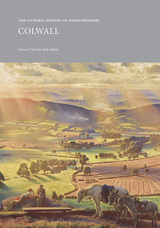
The Victoria History of Herefordshire
Colwall
James P. Bowen
University of London Press, 2020
This book provides a detailed history of the English village of Colwall, including its geography, economy, infrastructure, industry, and population. Colwall lies on the western slopes of the Malvern Hills, near the market town of Ledbury. The large village comprises Colwall Stone, Upper Colwall, and Colwall Green.
Discussing well-known landmarks, such as the Iron Age British Camp and the nearby mineral springs, this local history provides a narrative of the village’s development through the age of the landed gentry between the fifteenth and seventeenth centuries, the agricultural era of the eighteenth century, and the development of a spa economy in the mid-nineteenth century. Industrialization changed the town, with new railway infrastructure, tunnels, and the 1892 opening of the Schweppes bottling plant at Colwall Stone. Today, Colwall’s rural location and beautiful scenery continue to attract both visitors and new residents to the town, making this text a valuable resource for tourists and locals alike.
Discussing well-known landmarks, such as the Iron Age British Camp and the nearby mineral springs, this local history provides a narrative of the village’s development through the age of the landed gentry between the fifteenth and seventeenth centuries, the agricultural era of the eighteenth century, and the development of a spa economy in the mid-nineteenth century. Industrialization changed the town, with new railway infrastructure, tunnels, and the 1892 opening of the Schweppes bottling plant at Colwall Stone. Today, Colwall’s rural location and beautiful scenery continue to attract both visitors and new residents to the town, making this text a valuable resource for tourists and locals alike.
[more]

Territories, Commodities and Knowledges
Latin American Environmental Histories in the Nineteenth and Twentieth Centuries
Christian Brannstrom
University of London Press, 2004

Cuba Under Castro
Ambassadorial Reflections
David Brighty
University of London Press, 2004

Victoria County History of Cumbria
Kirkoswald and Renwick
Richard Brockington
University of London Press, 2019
Kirkoswald and Renwick is the first parish history to be produced by the Cumbria County History Trust in collaboration with Lancaster University for the Victoria County History of Cumbria. Covering 30 square miles of agricultural land and moorland, the modern civil parish of Kirkoswald lies between the river Eden and the Pennine heights, on the western edge of the North Pennine Area of Outstanding Natural Beauty. Kirkoswald township, anciently a market and small industrial centre, lies nine miles north east of Penrith. Until 1566 Kirkoswald Castle was the principal seat of the powerful Barons Dacre of the North whose massive landholdings extended over six counties. In 1523 Lord Thomas Dacre translated St Oswald’s church, a pre-conquest foundation for which the village is named, to collegiate status, and after the Reformation the college became a gentleman's residence, acquired in 1611 by the Fetherstonhaugh family whose home it still is after 400 years and 11 generations of descent. The economy, largely dependent on agriculture, benefited for 600 years from Kirkoswald's role as a market and business centre, with some manufacturing (textiles, paper and timber) powered by the waters of the Raven Beck. From 1631 to about 1850 there was coal mining on the Pennine Edge (with associated lime-burning). In the 21st century the parish remains an unspoilt and beautiful corner of England, home to some 30 farms specialising in animal husbandry, and many retired people and commuters to Penrith and Carlisle.
[more]

Regional Integration in Latin America and the Caribbean
The Political Economy of Open Regionalism
Victor Bulmer-Thomas
University of London Press, 2001
READERS
Browse our collection.
PUBLISHERS
See BiblioVault's publisher services.
STUDENT SERVICES
Files for college accessibility offices.
UChicago Accessibility Resources
home | accessibility | search | about | contact us
BiblioVault ® 2001 - 2024
The University of Chicago Press


